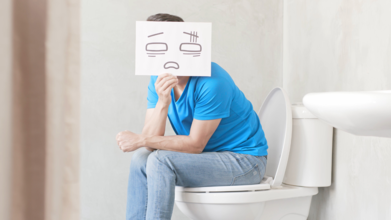- Health Conditions A-Z
- Health & Wellness
- Nutrition
- Fitness
- Health News
- Ayurveda
- Videos
- Medicine A-Z
- Parenting
- Web Stories
74-Year-Old Who Exercised Daily Still Got High Cholesterol: Neurologist Explains Why

It is common to run into health problems as you age. Your bodily functions become slow, so does your mobility as well as your immunity. However, with the right healthy choices, you can also age gracefully and avoid any big health issues. This 74-year-old also had the same idea, exercising regularly and keeping his health in check.
On the surface, he's a picture of perfect health. He has never had a heart attack or a stroke, and he doesn't have common health issues like diabetes or high blood pressure. He's also very dedicated to his well-being, exercising regularly, keeping a normal weight, and avoiding smoking and alcohol. His family also has a clean bill of health when it comes to heart problems.
Highlighting this interesting case Neurologist Sudhir Kumar MD, shared the details on his X social media.
Can You Have High Cholesterol With Healthy Habits?
Despite all his good habits, a routine blood test told a different story. His blood fats, or lipid profile, showed some concerning numbers that have been high for the last 10 years. His total cholesterol, "bad" LDL cholesterol, and triglycerides were all higher than they should be, while his "good" HDL cholesterol was too low.
- Total Cholesterol: 219
- LDL ("Bad") Cholesterol: 159
- Triglycerides: 319
- HDL ("Good") Cholesterol: 32
This specific combination is known as atherogenic dyslipidemia. It's a medical term for a pattern of unhealthy fats in the blood. Even though he feels great, this condition, combined with his age, puts him at a much higher risk for serious issues down the road, like a heart attack, stroke, or a type of memory loss called vascular dementia.
How Can You Lower Cholesterol Of a Healthy Patient?
Faced with this situation, the doctor and the patient discussed two possible paths.
Option 1:
Lifestyle ManagementThe first option was to continue his healthy lifestyle and work with a nutritionist to make his diet even better. This would be a non-medicated approach to see if his numbers could improve naturally.
Option 2:
MedicationThe second option was to start taking a statin, a type of drug that lowers cholesterol. The doctor would then recheck his lipid profile after a few months. If his triglycerides were still too high, another medication, such as fenofibrate, might be added. The doctor also explained the potential side effects of statins so the patient could make an informed decision.
After hearing both options, the patient felt more comfortable with Option 1, preferring to avoid medication for now. Dr Sudhir ended the post explaining he will follow up in three months to see how the patient's health is progressing.
What Are Some Unexpected Causes Of High Cholesterol?
Beyond daily habits, some life events and medications can also cause a temporary rise in cholesterol.
Stress
When you're stressed, your body produces the hormone cortisol, which can raise cholesterol. Managing stress through exercise, meditation, or breathing exercises can help lower this risk.
Smoking
Nicotine in cigarettes lowers your HDL ("good") cholesterol, which is responsible for removing "bad" cholesterol from your blood. The best way to reduce this risk is to quit smoking.
Medications
Certain prescription drugs, including some for high blood pressure, inflammation, and infections, can raise cholesterol levels. If you're concerned about your medication, talk to your doctor about alternatives or dosage adjustments.
Pregnancy
It's normal for a pregnant person's cholesterol to increase by 30-40% to support fetal development. However, a doctor may intervene if the levels get too high.
Rapid Weight Loss
Losing weight very quickly, especially on diets like the ketogenic diet, can cause a temporary spike in cholesterol. If you're planning to lose weight, it's a good idea to work with a healthcare professional to do it safely.
Harvard Psychologist Lists Careers Linked To Higher Rates Of Suicide: Doctors Maybe At High Risk Themselves

(Credit- Canva)
Suicides are one of the leading causes of death around the world. While it is easy to say that the person who chose to take their lives did it of their own violation, Harvard psychologist Dr. Matthew Nock, explains the other side. “90% of people who try and kill themselves say, I didn't want to die per se. I wanted to escape from seemingly intolerable.” Speaking on the On Purpose podcast with Jay Shetty, Dr. Nock pointed out that the link between work pressure and suicidal thoughts varies by race and ethnicity.
The concerning rise in suicide cases tied to work pressure has fueled a social media conversation about toxic work culture. What was once considered a normal part of the professional grind is now being openly challenged, as people share personal stories of the anxiety, depression, and isolation caused by unhealthy work environments.
What Professions Are At High Risk Of Suicide?
According to Dr. Matthew Nock, certain careers are linked to a higher risk of suicide.
Police Officers
He noted that physicians and police officers are among those at high risk. He mentioned a spike in suicides among New York City police officers, who are predominantly white men, and shared that female police officers, in particular, face a higher risk, even when accounting for factors like age, race, and ethnicity.
According to a 2025 study published in the Police Practice and Research, on average, 21.4 out of every 100,000 officers died by suicide each year.
The study showed that the suicide rate was much higher for male officers (22.7 per 100,000) than for female officers (12.7 per 100,000).
Physicians
Dr. Nock explained that access to means is a significant factor in these high-risk professions, which helps explain why physicians, police officers, and military members have a much higher risk of suicide compared to others.
Another study published in 2024 The BMJ, showed that the number of suicides among doctors has been going down, female doctors are still at a much higher risk than other people.
When looking at all the data, male doctors were found to have a 5% higher risk of suicide compared to the general population.
In a more recent analysis of the last few years, the overall suicide rate for doctors has decreased, which is good news. But even with this improvement, female doctors still have a 24% higher risk than the general public.
Why We Need To Talk More About Suicide
Dr. Nock stresses the importance of openly discussing suicide, particularly in schools. He compared it to fire drills or earthquake preparedness, saying that since 15% of people will experience suicidal thoughts, it's crucial to equip everyone with a safety plan..Dr. Matthew Nock said, "We know that asking about suicide, talking about suicide, does not make people suicidal."
He noted that the people who act on suicidal thoughts often show different signs than those who just have the thoughts. While depression is a strong predictor of having suicidal thoughts, other factors like anxiety, aggressiveness, poor behavioral control, and drug or alcohol use are more closely linked to a person actually attempting suicide.
He believes that a small educational module on suicide in health class could help save lives by teaching people what to do if they or someone they know is struggling.
Lung Cancer Rates Linked With Pollution Are Down In US, But THIS Country Is Still Suffering: Study

(Credit- Canva)
While we all know air pollution affects our health, did you know that it was actually driving cancer cases higher? This has led to a big rise in health problems worldwide. Past studies show that air pollution is linked to about seven million premature deaths each year and contributes to over 3% of all years of healthy life lost globally. This revelation was a big concern for public health, and to fix it, many measures were taken.
While some countries like the US showed promising results in bettering public health, a recent study in the International Journal of Public Health showed that this positive trend is not yet showed up in China.
How Is PM2 Pollution Affecting Our Health?
One of the most dangerous types of air pollution is called fine particulate matter, or PM2.5. These tiny particles come from car exhaust, factory smoke, and even from the smoke created by burning solid fuels inside homes. Because they are so incredibly small, they can stay suspended in the air for a long time and, when we breathe them in, they go deep into our lungs.
Once inside the body, PM2.5 can cause inflammation and even change our genes, which increases our risk for many illnesses, especially tracheal, bronchial, and lung (TBL) cancers. A new study looked at how much PM2.5 pollution has affected TBL cancer rates in China, Japan, South Korea, and the United States from 1990 to 2021.
Has Pollution-Related Health Risk Decreased Everywhere?
The study, which used data from the Global Burden of Disease (GBD) project, found some important trends:
Overall Cancer Rates Are Declining
The good news is that globally, the number of deaths and years of healthy life lost due to TBL cancer linked to PM2.5 pollution are going down. This positive trend was consistent in all the countries studied: China, Japan, South Korea, and the U.S.
China's Unique Challenge
Despite this global trend, China faced a much higher death rate from TBL cancer linked to PM2.5 compared to the other three countries. While their rates are decreasing, they still remain significantly higher than the worldwide average.
Household Pollution Hits Women Harder
The research also looked at pollution from burning solid fuels inside homes. The global death rate from TBL cancer linked to this type of pollution has remained stable, but it's actually increasing for women while it's decreasing for men. This highlights a specific danger for women in homes that rely on these fuels.
Will This Pollution Cancer Trend Keep Rising?
Looking ahead, researchers predict that the global death rate for TBL cancer caused by PM2.5 will actually increase over the next 29 years. However, the study notes that countries like China, South Korea, and the U.S. are expected to see a significant drop in their rates, while Japan's numbers are expected to stay about the same.
Overall, this study shows that while air pollution is a serious global health risk, the efforts to reduce PM2.5 exposure in many countries are making a real, positive difference.
'You’ve Been Pooping Wrong All Your Life' According To Harvard Gut Doctor, 3 Mistakes That Harm Your Health

(Credit- Canva)
Maintaining our gut health is not as easy as it seems. Even things like how you do your bowel movements could reveal how healthy your gut actually is. According to Dr. Saurabh Sethi, a board-certified gastroenterologist, many of us are making common mistakes on the toilet that can lead to real health problems. Here are three crucial habits to change to improve your gut health. Here are three mistakes' people make will they are in the washroom.
3 Bathroom Mistakes You Are Making
Stop Straining
Pushing or straining when you poop can cause serious issues like hemorrhoids, which are swollen veins in your rectum and anus, and anal fissures, which are small tears in the lining of your anus. In more severe cases, it can even lead to rectal prolapse, where part of the rectum slides out of the anus. Instead of forcing it, focus on taking deep breaths. This helps your abdominal muscles relax and allows your body to do its job naturally, reducing the risk of painful complications.
Put Down Your Phone
Scrolling on your phone while on the toilet can be a bad habit. Spending extra time on the toilet, even if you’re not straining, puts pressure on the delicate veins in your rectum. This can cause them to swell, significantly increasing your risk of hemorrhoids. To protect yourself, it’s best to keep your bathroom breaks short—ideally, under five minutes.
Don't Ignore the Urge
When you feel the need to poop, it's important not to hold it in, which makes it much more difficult to pass later, leading to and worsening constipation. When you feel the need to go, listen to your body. Holding it in causes your stool to get harder and drier, which makes constipation much worse and more painful later on. Train your gut to go when it says it's time.
Simple Ways To Improve Your Bowel Movements
Go at the Same Time Each Day
Try to create a routine. If you're often straining without success, try sitting on the toilet about 30-60 minutes after a meal, when your colon is naturally more active. A little stretching or a short walk beforehand can also help things get moving.
Use a Stool for Your Feet
The natural position for a bowel movement is squatting. You can mimic this position on a regular toilet by placing a small stool under your feet to raise your knees above your hips. This simple change helps your muscles relax and can make bowel movements easier and more complete.
Focus on Fiber and Fluids
Fiber is essential for creating soft stool that's easy to pass. Most adults should aim for 25 to 35 grams a day. Just remember to add it to your diet slowly. As you increase your fiber, be sure to drink more water and other non-caffeinated fluids, since caffeine can dehydrate you and make stool harder.
When to Seek Help
While these tips are a great starting point, sometimes you need more personalized help. You should talk to your doctor if you notice any of these signs:
- A recent, unexplained change in your bowel habits
- Blood in your stool
- Unexplained stomach pain
- A pelvic health physical therapist can also provide a full evaluation and create a personalized plan to improve your bowel health.
© 2024 Bennett, Coleman & Company Limited

